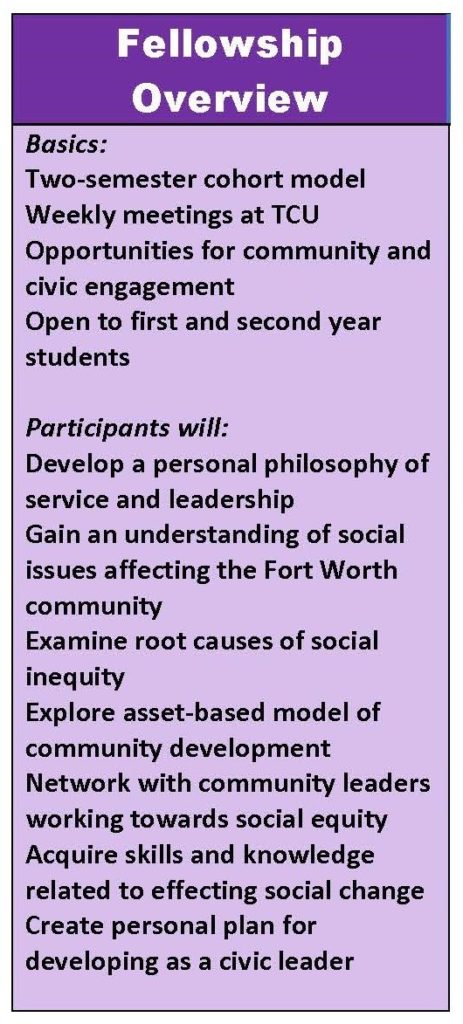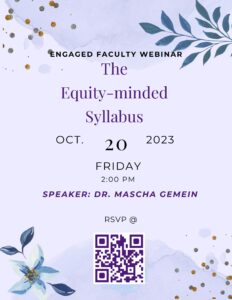Public Service Consulting Corps
In order to encourage students to grow as civically engaged leaders and build capacity within non-profit organizations serving the Fort Worth community, the office of Service-Learning and Academic Initiatives, in collaboration with the Center for Career and Professional Development, has created the Public Service Consulting Corps Program. This internship program provides a select group of students the opportunity to take part in a unique academic two-semester internship experience at a non-profit.
By participating in the program, students will be eligible to apply for a scholarship ( up to $2000) each semester they contribute a minimum of 150 hours, and will have the opportunity to develop and enhance their professional development skills, as well as expand their professional network. As part of the Corps, students will receive support from an on-site supervisor, and they will also meet with a TCU Advisor on campus. Additionally, all Corps members will come together once a month to network, share their experiences, and reflect on their learning.
To become a member of the Corps in the next academic year, students must apply by April 10, interview with TCU staff and potential community sites and be selected by an internship host organization. All selected students will be notified by the end of the Spring semester.
Info Sessions
March 6 | 3pm
March 22 | 11am
March 25 | 9am
March 28 | 12pm
Zoom ID 596 493 0596
Public Service Corps Magazine
Corps Member Requirements:
- Work 150 hours a semester. (appx. 10-15 hrs a week) during the fall and spring semesters.
° With site supervisor permission, some hours may occur off-site.
- Complete one program on-campus in the fall semester to raise awareness about their internship site or site’s area of focus.
° Programs/projects can include organizing student volunteers from campus to participate in an agency event.
- Attend monthly Corps meetings.
- Meet bi-monthly with their assigned TCU advisor.
- Work in collaboration with site supervisor to develop a legacy project for the organization.
- Complete an end of semester and end of year evaluation.
FORT WORTH FELLOWS
Build your legacy, network with community/city leaders, and join a select group of first and second year students dedicated to social change.

Basics: Two-Semester cohort model Weekly meetings at TCU Opportunities for community & civic engagement Open to first and second year students Participants will: Develop a personal philosophy of service and leadership Gain an understanding of social issues affecting the Fort Worth community Examine root causes of social inequity Explore asset-based model of community development Network with community leaders working towards social equity Acquire skills and knowledge related to effecting social change Create personal plan for developing as a civic leader
To better prepare students for their roles as ethical leaders and responsible citizens in a global community, the Fort Worth Fellows program seeks to provide students with an introduction to community engagement and public service. To become a member of Fort Worth Fellows, students must apply by March 31. Interviews will take place in April and selected students will be notified by the end of the Spring semester.
Overview:
Fort Worth Fellows is a unique, cohort based program in which students learn about the social issues impacting Fort Worth, examine strategies to promote social justice, connect with non-profit organizations, community and city leaders, and contribute to social change through advocacy and service.
Core Expectations:
Attend our mini retreat date TBA
Attend and actively participate in weekly cohort meetings
Meet monthly with Fellows advisers to individualize future involvement and discuss progress
Complete a minimum of 10 hours of service per semester individually or with interest group formed in class
Participate in 2 service events a semester with entire Fellows cohort
Remain in good academic & disciplinary standing
For more information on Fort Worth Fellows, please contact Rosangela Boyd at r.boyd@tcu.edu
ACADEMIC SERVICE-LEARNING
Academic Service-Learning is a pedagogy based on the principles of experiential education, which integrates community service with academic study. Faculty, in collaboration with representatives from community organizations, design service projects that enhance student learning and help meet community needs. Through structured reflection, students consider relationships between the service experience, the academic content of the class, and its impact on their personal values and professional goals.
A growing number of departments and programs currently utilize service-learning, some having sought the assistance of Community Engagement in building community partnerships, while others developed projects independently. Our office works continuously to develop a comprehensive list of service-learning courses based on information by faculty members.
Want to learn how to link your college degree to nonprofit careers? Click here!
If you want to find out more about SL courses offered at TCU, contact us at oce@tcu.edu.
MODEL UN
The award-winning Model United Nations program at TCU is a joint program of Leadership & Student Involvement and the Department of Political Science. It offers students the opportunity to simulate the workings of the United Nations as representatives of one of the member-states of the UN. In their capacity as delegates to Model UN conferences, students research the policies of their designated country on a variety of topics, including international trade and development, terrorism, international conflict, weapons of mass destruction, human rights, and the environment. Participation in conferences also helps students to improve their negotiating, public speaking and writing skills.
Participation in this program is a wonderful opportunity for students to learn about the issues confronting the world in which they live from diverse perspectives. If you have any questions, please contact Eric Cox at e.cox@tcu.edu or visit Department of Political Science.
Meaningful community engagement is critical for the Burnett School of Medicine. Community-oriented partnerships bring together academic institutions, neighborhood organizations, health service providers, businesses, philanthropic supporters and governments in an unprecedented manner to launch joint ventures aimed at addressing critical health care needs. Our office is playing a vital role in developing and strengthening community connections as the Burnett School of Medicine strives to educate Empathetic Scholars.



